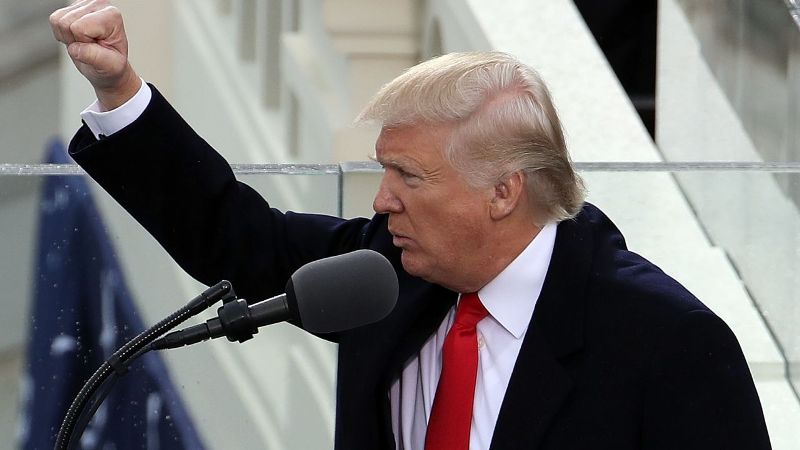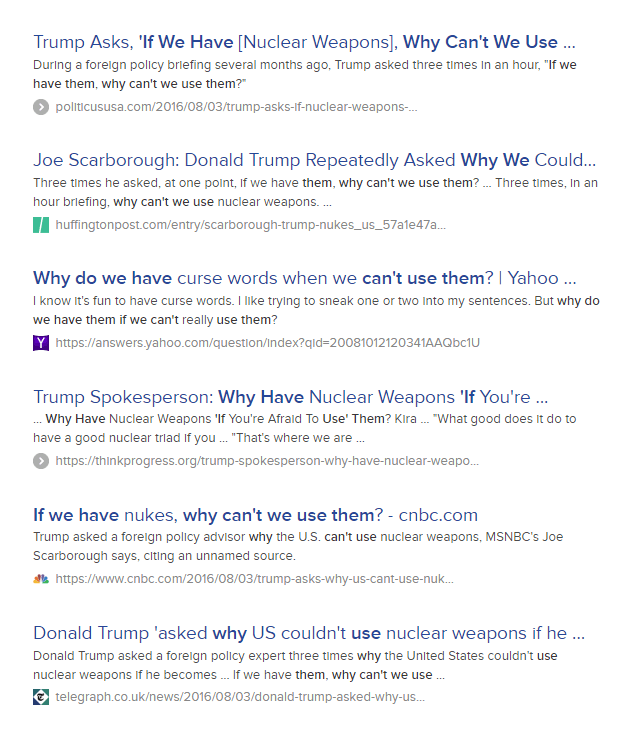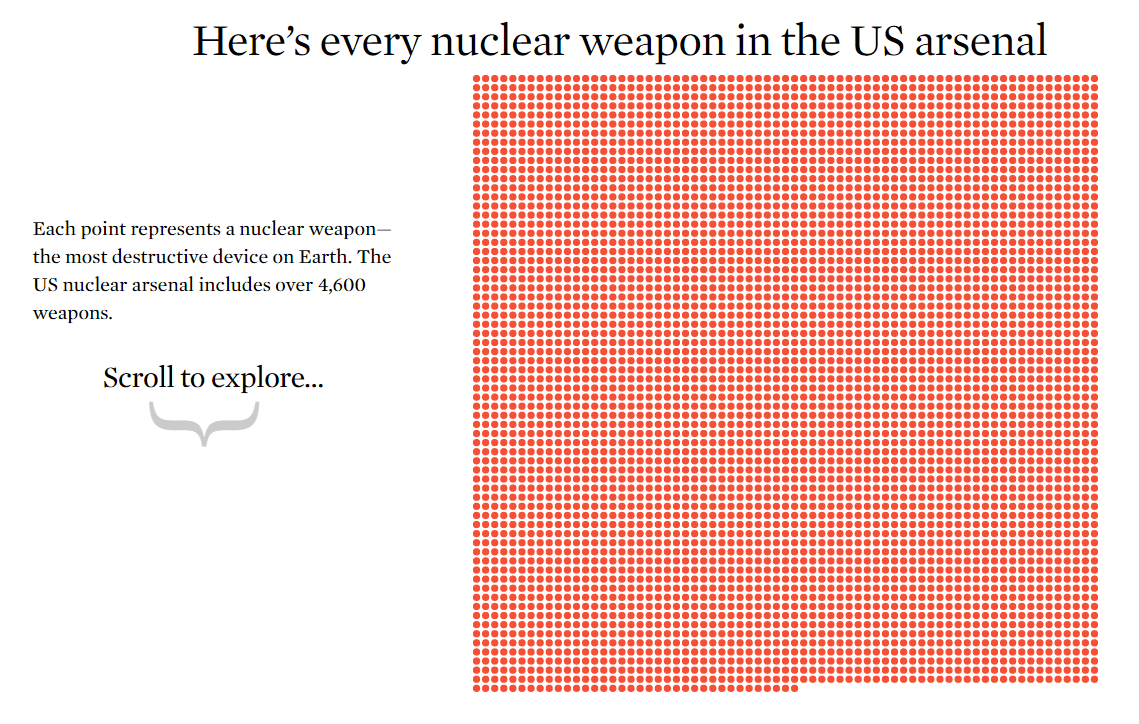The US Nuclear Arsenal
What is it there for, if it can’t be used?
– The U.S. President


The U.S. Nuclear Arsenal
To be Used on Order of the Commander in Chief
Donald J. Trump, United States President
Action to Limit Nuclear Risks / Order to Launch
‘Sole Authority’, Commander-in-Chief / Nuclear ‘Hairtrigger’
Congressional action to prevent first-use / Restricting first-strike policy
A Proposal to Limit Nuclear First Use
An Act to Ensure the Safe Use of the Nuclear Option
(Via Strategic Demands / Draft – August 26, 2017)
PROPOSED BILL
To provide for a body of eminent persons to study, monitor, and submit recommendations on the capacity of the President to discharge the powers and duties of his office, including the first use of nuclear weapons.
SECTION 1. SHORT TITLE .
This Act may be cited as the “Act to Establish a Body of Eminent Persons to Carry Out 25th Amendment Oversight.”
SEC. 2. PURPOSE.
The purpose of this Act is to provide, in accordance with powers granted Congress by section 4 of the 25th Amendment of the Constitution, for a body of eminent persons to study, monitor and submit recommendations on the capacity of the President of the United States to discharge any or all of the powers and duties of his office, including any decision for the first use of nuclear weapons.
SEC. 3. MEMBERSHIP AND POWERS.
(a) (1) A body is hereby established to carry out the power entrusted it under section 4 of the 25th Amendment of the Constitution to transmit to the President pro tempore of the Senate and the Speaker of the House of Representatives their written declaration that the President is unable to discharge the powers and duties of his office in any or all particulars. The body created by this section shall have all powers necessary and proper to carry out this task, including the power to conduct studies, request and subpoena information, monitor the activities of the president, and submit recommendations to Congress on all matters related to the capacity of the President to carry out any or all of the powers and duties of his office.
(2) The body established by this section shall be named “The Body of Eminent Persons.”
(b) Except as provided in subsection (c), the following individuals shall constitute The Body of Eminent Persons:
(1) Both the senior and the most recent former living President, respectively, of each political party, consisting of four persons. Each such former president may temporarily delegate duties to a Vice President of their respective administrations, upon written notice to the Body of Eminent Persons describing the scope of the delegation.
(2) (i) Eminent persons of expertise in the fields of medicine, psychology, the legal profession including constitutional law scholars, political science, military strategy, journalism, and other areas of expertise relevant to determining the capacity of the President to discharge the powers and duties of the presidency. This body shall consist of forty persons, of whom no more than four shall be politicians who have held elected office. Any vacancies shall be filled in the same manner.
(ii) An equal number of such forty persons shall be selected for membership of the body, one quarter (ten) each, by each party caucus of the Senate and of the House.
(c) Disqualification, and Removal From The Body.—The following individuals shall not be members of The Body of Eminent Persons established under subsection (a) hereof:
(1) Any individual impeached by the House of Representatives.
(2) Any individual serving as President or Vice President, either at the time of their appointment or when the declaration or other action of incapacity is made under this Act.
(3) Any member appointed to any position in the administration of the executive branch, or to the judicial branch, or to any other official appointment by such individual described in this subsection.
(4) Any member of The Body of Eminent Persons identified in subsection (b) may be removed from The Body by a vote of 33 members of such body.
(d) A quorum for the Body shall be 24 members. Actual notice shall be required to all members for a non-scheduled meeting of the Body. If the body be equally divided on any matter, the Speaker of the House shall decide.
SEC. 4. CONTROLLING FIRST USE OF NUCLEAR WEAPONS
(a) As soon as possible after any presidential decision, and no less than 24 hours prior to giving any related order, for first use of nuclear weapons by the United States, unless such weapons are deployed in the conduct of a war that has been declared by Congress under Article I, Section 8(11) of the Constitution, the Body of Eminent Persons shall be notified by the President. In default thereof it shall be the separate obligation of every other person necessary to order and carry out the use of nuclear weapons to provide such notification.
(b) Immediately upon receiving such notice the Body shall deliberate and vote whether the President is competent to make a decision to use nuclear weapons at that time. The Body of Eminent Persons shall be bound by secrecy in all aspects of their deliberations under this section. Upon completing their deliberations, the majority vote of the Body, a quorum for which shall be 33 members, shall be communicated to the President, and to the Chairman of the Joint Chiefs, and to both houses of Congress. If applicable, such communication shall be in the form of the written declaration described in Sec 3(a)(1), provided the relevant terms for such declaration are satisfied.
(c) Congress upon receipt of such written declaration shall immediately vote whether to approve the first strike use of nuclear weapons as proposed by the President. If Congress does not vote to approve such action it shall be cancelled and anyone who orders or carries out such an attack shall be guilty of a war crime.
(d) Any violation by the President of this law shall be a constitutional high crime, also punishable as a felony.
SEC. 5. Termination Of Body.
The body described in Section 3 shall terminate upon the sooner of a) whenever Congress shall determine the Body no longer necessary or proper, or b) by a 3/4 vote of The Body to dissolve itself.
SEC. 6. Treaty.
The Secretary of State shall report to Congress within one year from the date hereof on the feasibility of concluding an international treaty among nuclear powers which is compatible with the provisions of this law.
♦
More than a Legislative Proposal…
A Strategic Demand
Confronting nuclear war and existential security risks, green politics continues to focus on clear and present dangers, looking to the future with hope and optimism, in opposition to nuclear proliferation and nuclear conflict.
The threat of nuclear conflict in the Korean peninsula has risen to a point of imminent and present danger.
The US decision-making process on the use of nuclear weapons, as the former Director of National Intelligence recently pointed out, is designed for quick action. “There’s actually very little to stop him,” James Clapper said in late August, referring to the president and to the president’s erratic behavior and ability to order the use of strategic and/or tactical nuclear weapons.
It is time to limit the current power vested in the hands of one individual who alone has authority to order a nuclear first-strike.
It is overtime for a reappraisal — and reordering of the nuclear decision-making process.
— Strategic Demands and GreenPolicy360 / September 2017
†



